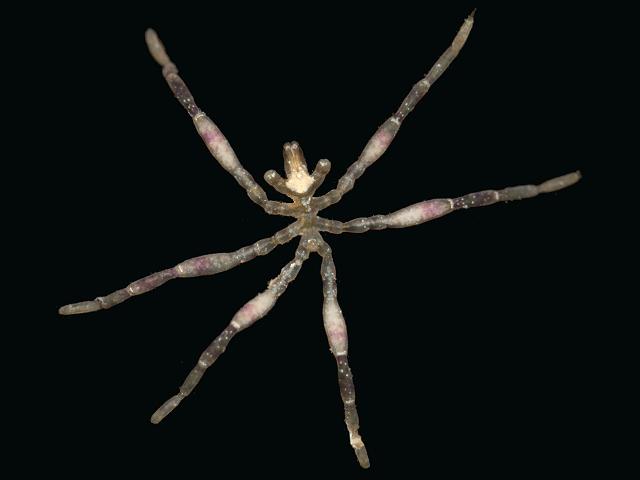
APHOTOMARINE
An educational resource dedicated mainly to the photography
and diversity of marine life that can be found in coastal waters
and intertidal areas of Great Britain and Ireland by David Fenwick.

Anoplodactylus angulatus (Dohrn, 1881) - A phoxichilidiid sea spider (Pycnogonida Images)
Scroll down and rollover titles to change screen image or click on title to view image.
Phoxichilidiid sea spider
Anoplodactylus angulatus
- dorsal view 1
Anoplodactylus angulatus
- dorsal view 1
Phoxichilidiid sea spider
Anoplodactylus angulatus
- ventral view 1
Phoxichilidiid sea spider
Anoplodactylus angulatus
- dorsal view anterior 1
Phoxichilidiid sea spider
Anoplodactylus angulatus
- ventral view anterior 1
Phoxichilidiid sea spider
Anoplodactylus angulatus
- ventral view 2
Phoxichilidiid sea spider
Anoplodactylus angulatus
- dorsal view / 0.1mm scale 1
N.B. Specimen above lacks two front legs. It was found in sample of coralline algae, Coral Weed and Pink Plate Weed, taken from the lowershore between Gyllyngvase and Swanpool, Falmouth, Cornwall. 06.12.14.
Phoxichilidiid sea spider
Anoplodactylus angulatus
- with egg case 1
Phoxichilidiid sea spider
Anoplodactylus angulatus
- with egg case 2
Phoxichilidiid sea spider
Anoplodactylus angulatus
- with egg case 3
Phoxichilidiid sea spider
Anoplodactylus angulatus
- with egg case 4
Above specimen found with egg case at Little London reef, near Marazion, Cornwall. 28.10.14.
Phoxichilidiid sea spider
Anoplodactylus angulatus
- dorsal view 2
Phoxichilidiid sea spider
Anoplodactylus angulatus
- dorsal view 3
Phoxichilidiid sea spider
Anoplodactylus angulatus
- ventral view 3
Phoxichilidiid sea spider
Anoplodactylus angulatus
- dorsal view close-up 1
Phoxichilidiid sea spider
Anoplodactylus angulatus
- ventral view close-up 1
Phoxichilidiid sea spider
Anoplodactylus angulatus
- legs 1
Specimen above found in a small sample of Coral weed taken from the lowershore at Albert Pier Reef, Penzance, Cornwall. 07.10.14.

The main objective of this website is in furthering environmental awareness and education through the medium of photography. To increase awareness and access to the wildlife of the region and help
people find and identify it. Sometimes the difference between species is obvious but many species can only be determined by observing microscopic characteristics that are specific to any one species.